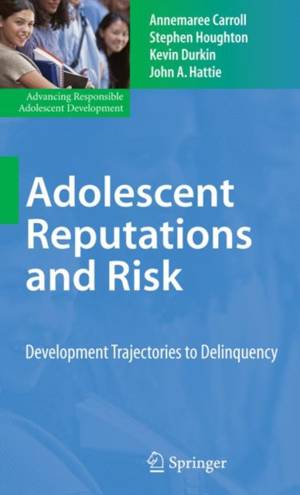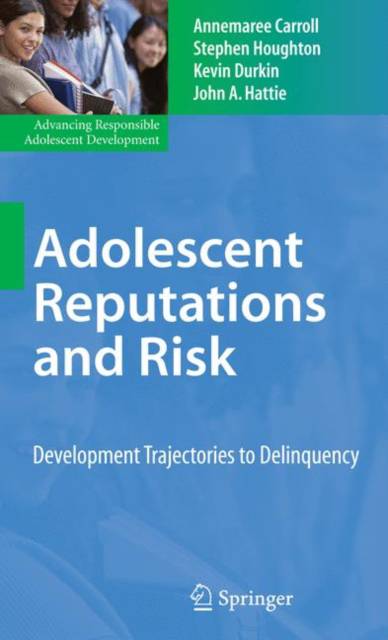
- Retrait gratuit dans votre magasin Club
- 7.000.000 titres dans notre catalogue
- Payer en toute sécurité
- Toujours un magasin près de chez vous
- Retrait gratuit dans votre magasin Club
- 7.000.000 titres dans notre catalogue
- Payer en toute sécurité
- Toujours un magasin près de chez vous
Adolescent Reputations and Risk
Developmental Trajectories to Delinquency
Annemaree Carroll, Stephen Houghton, Kevin Durkin, John A HattieDescription
The news of teenagers and even younger children committing ever more serious and violent crimes continues to shock and baffle. The escalating psychological and social toll of youth crime is being paid by all - from victims to offenders to parents and siblings to teachers and to the community as a whole. "Adolescent Reputations and Risk" looks beyond traditional theories to examine, from a solid empirical basis, the motivation and values that make some young people choose antisocial over positive behavior, resulting in potent new insights and possible solutions to this ongoing problem.
Synthesizing 15 years of research with delinquent youth, this volume describes the volatile dynamic of child and adolescent social worlds, emphasizing reputation enhancement and goal-setting as bases underlying deviant behavior. In innovative and accessible terms, "Adolescent Reputations and Risk" addresses delinquency throughout the course of childhood and adolescence, offers the first detailed explanation of delinquency by integrating goal-setting and reputation enhancement theories, provides evidence analyzing deviant trends in goal-setting and reputation enhancement terms among primary and high school students, answers key questions on topics such as impulsivity, drug and inhalant use, early-childhood psychopathy, links between ADHD and aggression, and the psychology of loners and includes current data on interventions for at-risk youth, including family and school methods, cognitive-behavioral therapy, wilderness and boot camp programs, and interactive multimedia strategies.
This volume is an essential resource for clinical child, school, and counseling psychologists; social workers; and allied education and community mental health professionals and practitioners.
Spécifications
Parties prenantes
- Auteur(s) :
- Editeur:
Contenu
- Nombre de pages :
- 208
- Langue:
- Anglais
- Collection :
Caractéristiques
- EAN:
- 9780387799872
- Date de parution :
- 18-12-08
- Format:
- Livre relié
- Format numérique:
- Ongenaaid / garenloos gebonden
- Dimensions :
- 160 mm x 236 mm
- Poids :
- 453 g

Les avis
Nous publions uniquement les avis qui respectent les conditions requises. Consultez nos conditions pour les avis.






